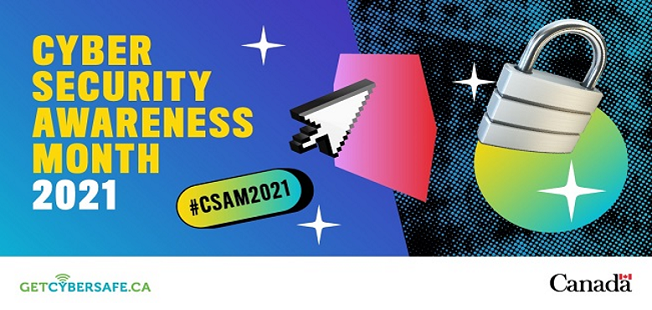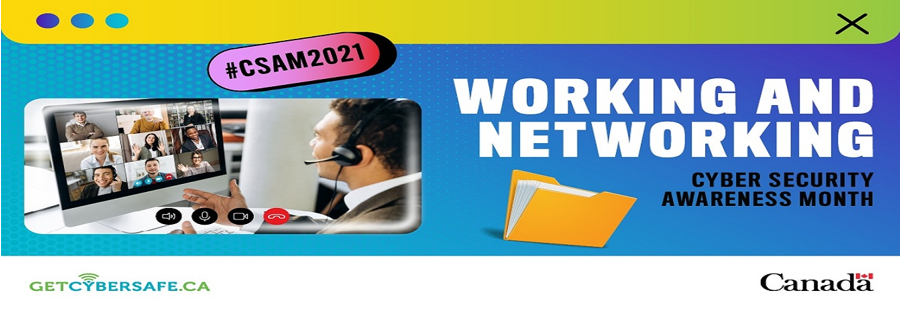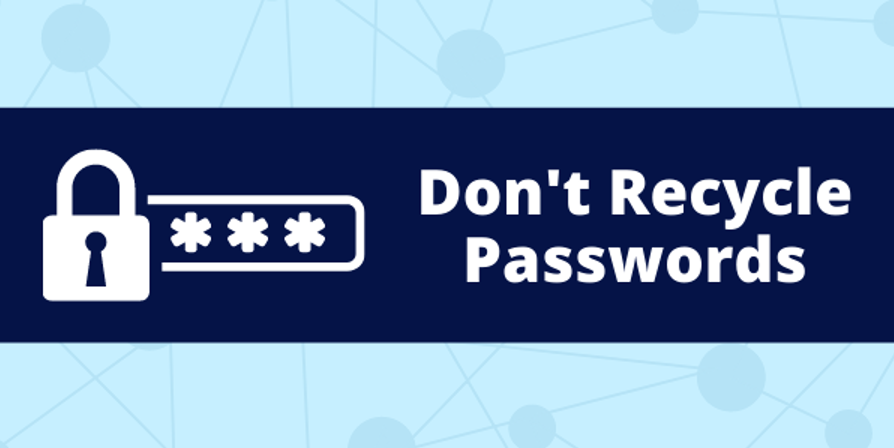Cyber Security Awareness Month - October

Across the Government of Canada, Cyber Security Awareness Month is an opportunity to raise awareness of the importance of adopting cyber security best practices in your day-to-day work.
Simple actions make a big difference. Here are some simple actions you can take, every day, to help protect our department's information, assets, and network from cyber threats.

Don’t miss these upcoming information sessions!
Get Cyber Safe – Live Information Session with the Canadian Centre for Cyber Security
Are you wondering how to protect yourself against cyber threats? This event, hosted by the Information Technology (IT) Security Awareness and Training Team, will give you the opportunity learn more and ask questions to an expert on cyber security. Francis Castonguay, Senior Engagement Advisor with the Canadian Centre for Cyber Security, will provide you with tips and tools to get cyber safe.
Discussion topics will include:
- How to recognize and report phishing;
- The cyber risks associated with remote working;
- Tips for selecting a strong password, or passphrase.
October 27, 2021 – English Session
1:00 p.m. - 2:00 p.m. (ET)
To register, open the Outlook invitation (ICS, 10 KB) in the Microsoft Edge Web browser. Select "Download." A pop-up may come up on your screen's top right corner, showing Downloads. Select "Keep" or "Open File" to open the invitation. Select "Accept: Send the Response Now" and the invitation will be saved in your calendar.
October 28, 2021 – French Session
1:00 p.m. - 2:00 p.m. (ET)
To register, open the Outlook invitation (ICS, 10 KB) in the Microsoft Edge Web browser. Select "Download." A pop-up may come up on your screen's top right corner, showing Downloads. Select "Keep" or "Open File" to open the invitation. Select "Accept: Send the Response Now" and the invitation will be saved in your calendar.
If you can’t make it to the information sessions and you have questions, don’t worry. You can send them to the IT Security Awareness and Training Team.
The platform for this event does not offer live captioning. If you need captioning services, please contact the Innovation, Information and Technology Branch Change Management and Communications team as soon as possible.
Across the Government of Canada, Cyber Security Awareness Month is an opportunity to raise awareness of the importance of adopting cyber security best practices in your day-to-day work.
Simple actions make a big difference. Here are some simple actions you can take, every day, to help protect our department's information, assets, and network from cyber threats.
Practical Ways to be Cyber Safe
- Practise good password etiquette.
- Accept updates on mobile devices, computers, and applications. Do not ignore them.
- Secure your social media and email accounts. Use as many security settings as you can for all social media and email accounts, including multi-factor authentication, an alternative security feature to help prevent unauthorized access to your accounts.
- Be on guard for phishing messages and know how to spot phishing messages.
- Store your data securely and know your back-up procedures.

Need to host a meeting or event? Do you know the best tool to use? Although the preferred tool at ESDC is Microsoft Teams, there may be situations in which a different tool is better suited for your event. So, how do you choose the right tool for your meeting?
If you are unsure which to use, check out Choosing the Right Video and Audio Conferencing Tool on iService. Pay close attention to the information categorization of the tool you want to use to make sure you protect the information you're transmitting in your meeting.

Virtual assistants, such as Amazon Alexa and Google Home, are a cool new technology but there are risks surrounding them. Even when digital assistants are not in use, they are always listening for their "wake-up" commands. To be safe, turn off and/or disconnect your virtual assistant devices within hearing distance of work-related conversations to prevent the devices from recording sensitive information.
For more information on security measures while working from home, visit the iService page on the Best security measures to apply while working remotely.

How secure are your passwords? Here are some tips on how to make your passwords strong, including by using passphrases, to help protect your devices and your information.
A strong password should be at least eight characters long and contain uppercase letters, lowercase letters, numbers, and special characters. An example of a strong password would be p@ssW0rD.
Passphrases, a string of random words that make sense to you, are stronger than typical passwords because they can be remembered without being written down. They should be 12-16 characters long. An example would be Dan*sHrlyDvdsn (Dan's Harley Davidson).
For more information on creating a strong password, visit the iService page on How to create a strong password you can remember.